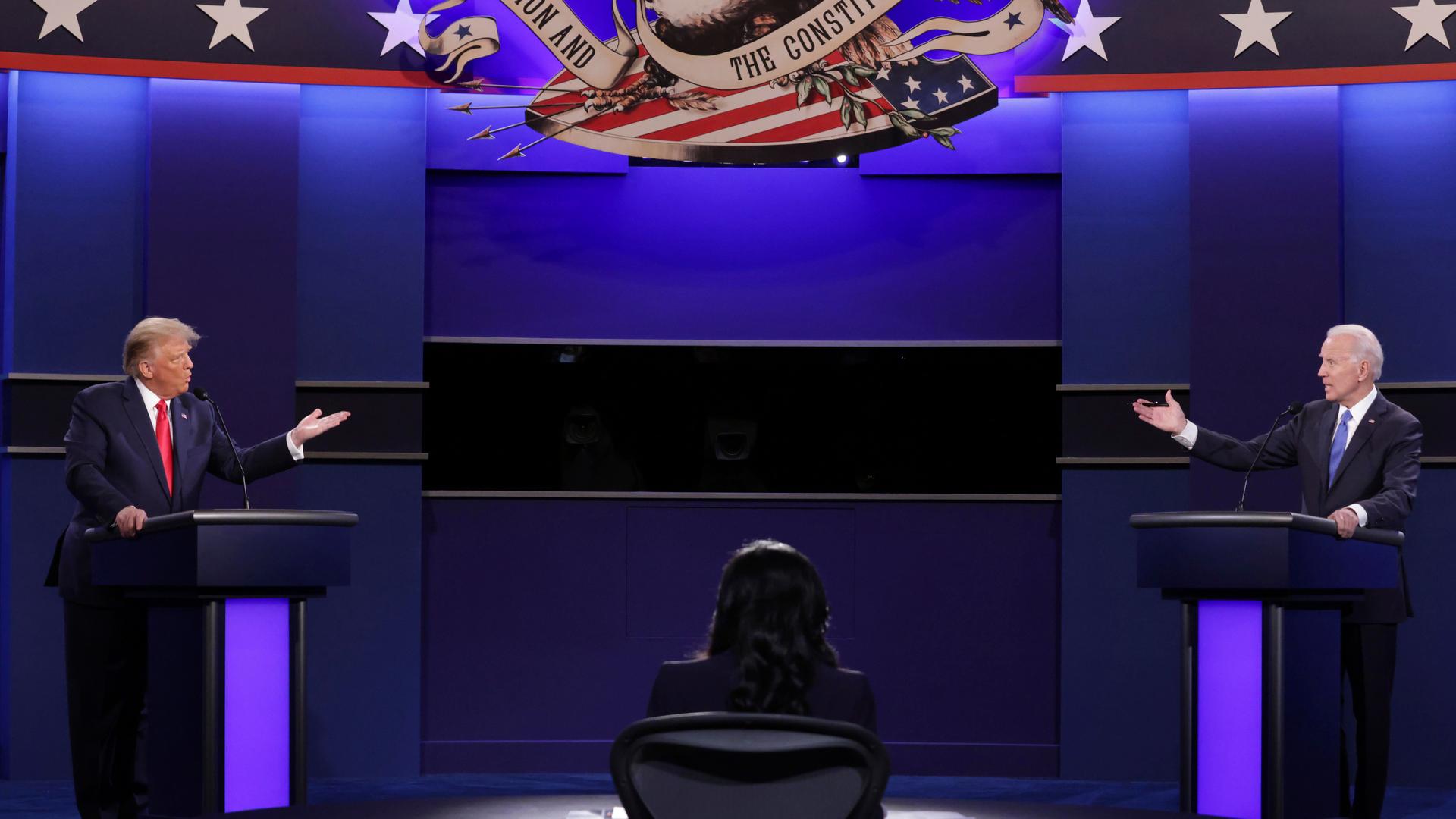Trump, Biden debate marked by clashes, but less chaos
President Donald Trump and Democratic presidential candidate former Vice President Joe Biden participate in the final presidential debate at Belmont University, Oct. 22, 2020, in Nashville, Tenn.
After the first presidential debate was panned so widely that organizers introduced a mute button, Thursday’s second and final debate between President Donald Trump and Democratic challenger Joe Biden was far more civil.
Whether because of that button or the terrible reviews — especially for Trump — the two interrupted each other far less frequently, even as they clashed on issues ranging from the coronavirus to crime.
Trump, in particular, was on his best behavior early, especially with the moderator, whom he’d repeatedly attacked before the debate.
“So far, I respect very much the way you’re handling this,” Trump said to NBC’s Kristen Welker when she gave him time to respond to Biden at one point.
Because of the pandemic, only around 200 people were seated inside the debate hall in the massive college arena in Nashville. That included a representative of the Commission on Presidential Debates, who was tasked with ensuring each candidate had a two full minutes of uninterrupted time to deliver opening answers on six major topics, according to debate commission chair Frank Fahrenkopf.
And it seemed to be working, at least during the debate’s opening questions. While Trump and Biden each shook his head disapprovingly during the other’s answer about the pandemic, there was minimal interruption. And neither man tried to speak while he was muted during the opening questions.
A member of each of the Trump and Biden campaigns monitored the person who controlled the mute button backstage, Fahrenkopf told The Associated Press, noting that the button would not be used beyond the first four minutes of each topic.
The button was among a handful of changes implemented by the nonpartisan debate commission to help ensure a more orderly debate following the raucous and widely criticized opening debate 23 days ago.
Trump was diagnosed with COVID-19 two days after the event, and he and the White House have refused to say whether he abided by commission rules and tested negative for the virus before that debate.
This time, Trump was given a test aboard Air Force One en route to Nashville Thursday and tested negative, White House chief of staff Mark Meadows said. Biden’s campaign reported he also tested negative.
Organizers initially planned to separate the candidates with plexiglass barriers, but removed them hours before the debate began. A Trump campaign official said the decision was made after Meadows called Anthony Fauci, the nation’s highly respected top infectious diseases expert, during a walkthrough of the venue site. Meadows them put Fauci on speakerphone, and Fauci told those in the room that all it would do was provide a false sense of security, the person said.
Additionally, any audience member who refused to wear a mask would be removed, organizers said. Last month, several members of the Trump family removed their masks once seated in the debate hall, but were allowed to stay. This time, Melania Trump, who was appearing in public for the first time since her own diagnosis with the virus, was seen in her seat wearing a mask.
Before the debate began, Fahrenkopf repeated the instruction to the small audience.
“If you won’t leave, you’ll be escorted,” he said.
Fahrenkopf said in an earlier interview that the safety measures would help reduce the risk of infection.
“The Trump campaign’s attitude was that the president was not contagious anymore, but we’re going to go with our medical advisers,” he said.
Indeed, the president of the university called it “the safest place in America tonight.”
The primetime affair played out inside a 90,000-square-foot (8,360-square-meter) arena at Belmont University, a picturesque institution of more than 8,200 students just a mile from Nashville’s music row. The university also hosted a town hall-style debate between Democrat Barack Obama and Republican John McCain in 2008.
There was a far smaller audience this time around.
Only around 200 people were allowed inside, a mix of invited guests of the campaigns and the debate commission, students, the commission’s production team, security, and health and safety personnel. Audience members were seated in accordance with social distancing recommendations; several empty seats separated each person or small group.
All audience members and support staff were required to undergo coronavirus testing onsite within three days of the event. They wore colored wristbands as evidence of their negative tests.
There were several layers of security protecting the attendees, and dozens of protesters gathered just off campus beyond the security perimeter. One of them held a large white sign: “220,000 DEAD … Trump FAILED US.”
Our coverage reaches millions each week, but only a small fraction of listeners contribute to sustain our program. We still need 224 more people to donate $100 or $10/monthly to unlock our $67,000 match. Will you help us get there today?
